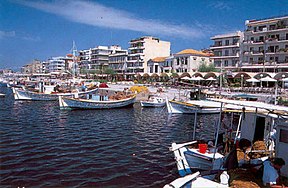Our website is made possible by displaying online advertisements to our visitors.
Please consider supporting us by disabling your ad blocker.
Kalamata
Kalamata
Καλαμάτα | |
|---|---|
Clockwise from top right: Promenade of Kalamata, Saint John Church, Kyriakou Folklore Museum, Kalamata City Hall, Archaeological Museum of Messenia, Church of the Holy Apostles, Kalamata Castle | |
| Coordinates: 37°02′16″N 22°06′40″E / 37.03778°N 22.11111°E | |
| Country | Greece |
| Administrative region | Peloponnese |
| Regional unit | Messenia |
| Government | |
| • Mayor | Athanasios Vasilopoulos[1] (since 2019) |
| Area | |
• Municipality | 440.3 km2 (170.0 sq mi) |
| • Municipal unit | 253.3 km2 (97.8 sq mi) |
| Highest elevation | 21 m (69 ft) |
| Lowest elevation | 0 m (0 ft) |
| Population (2021)[2] | |
• Municipality | 72,906 |
| • Density | 170/km2 (430/sq mi) |
| • Municipal unit | 66,135 |
| • Municipal unit density | 260/km2 (680/sq mi) |
| • Community | 58,816 |
| Time zone | UTC+2 (EET) |
| • Summer (DST) | UTC+3 (EEST) |
| Postal code | 241 00 |
| Area code(s) | 27210 |
| Vehicle registration | KM |
| Website | www |
Kalamata (Greek: Καλαμάτα [kalaˈmata]) is the second most populous city of the Peloponnese peninsula in southern Greece after Patras, and the largest city of the homonymous administrative region. As the capital and chief port of the Messenia regional unit, it lies along the Nedon River at the head of the Messenian Gulf.[3]
The 2021 census recorded 72,906 inhabitants for the wider Kalamata Municipality, of which 66,135 resided in the municipal unit of Kalamata, and 58,816 in the city proper.[2] Kalamata is renowned as the land of the Kalamatianos dance, Kalamata olives and Kalamata olive oil.
- ^ Municipality of Kalamata, Municipal elections – October 2023 Archived 8 May 2024 at the Wayback Machine, Ministry of Interior
- ^ a b "Αποτελέσματα Απογραφής Πληθυσμού - Κατοικιών 2021, Μόνιμος Πληθυσμός κατά οικισμό" [Results of the 2021 Population - Housing Census, Permanent population by settlement] (in Greek). Hellenic Statistical Authority. 29 March 2024.
- ^ For a detailed introduction to various aspects of the city, see the Kalamata Municipality’s online guide Archived 18 June 2024 at the Wayback Machine (undated)(retrieved 18/06/2024).
Previous Page Next Page












